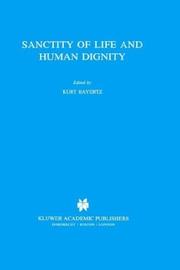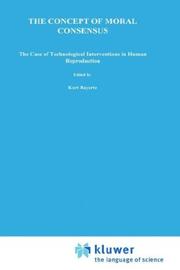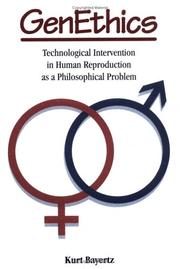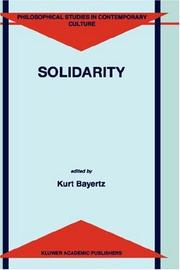| Listing 1 - 7 of 7 |
Sort by
|

ISBN: 0792337395 9401072124 940091590X 9780792337393 Year: 1996 Volume: v. 52 Publisher: Dordrecht : Kluwer,
Abstract | Keywords | Export | Availability | Bookmark
 Loading...
Loading...Choose an application
- Reference Manager
- EndNote
- RefWorks (Direct export to RefWorks)
Professional ethics. Deontology --- Legal theory and methods. Philosophy of law --- Biologie humaine -- Morale et aspects éthiques --- Biomedical ethics --- Biomedische ethiek --- Biomédecine -- Morale et aspects éthiques --- Deontologie [Medische ] --- Deontology [Medical ] --- Dignity --- Dignity [Human ] --- Dignité humaine --- Déontologie médicale --- Ethics [Medical ] --- Ethiek [Medische ] --- Ethique médicale --- Human dignity --- Medical care -- Moral and ethical aspects --- Medical deontology --- Medical ethics --- Medicine -- Moral and ethical aspects --- Medische deontologie --- Medische ethiek --- Menselijke waardigheid --- Morale et médecine --- Morale médicale --- Médecine -- Innovations -- Morale et aspects éthiques --- Médecine -- Morale et aspects éthiques --- Médecine et morale --- Politique sanitaire -- Morale et aspects éthiques --- Soins médicaux -- Morale et aspects éthiques --- Waardigheid [Menselijke ] --- Éthique clinique --- Euthanasia --- Life --- Euthanasie --- Dignité --- Vie --- Congresses --- Religious aspects --- Congrès --- Aspect religieux --- Dignity. --- Medical ethics. --- Religious aspects. --- 241.63 --- 17.023.33 --- -Medical ethics --- heiligheid van het leven (principe van heiligheid van het leven) --- menswaardigheid (waardigheid) --- persoon --- intensieve zorgen (zorg) --- Clinical ethics --- Ethics, Medical --- Health care ethics --- Medical care --- Medicine --- Bioethics --- Professional ethics --- Nursing ethics --- Social medicine --- Values --- Theologische ethiek: eerbied voor het leven en de waardigheid van de menselijke persoon --- Biologische doeleinden. Bio-ethiek; bioethiek. Übermensch. Medische deontologie --- sacralité de la vie (principe de la sacralité de la vie) --- dignité humaine --- personne --- soins intensifs --- Moral and ethical aspects --- Philosophy --- 17.023.33 Biologische doeleinden. Bio-ethiek; bioethiek. Übermensch. Medische deontologie --- 241.63 Theologische ethiek: eerbied voor het leven en de waardigheid van de menselijke persoon --- Ethique médicale --- Dignité --- Congrès --- Life - Religious aspects

ISBN: 0792326156 940104371X 9401108609 Year: 1994 Volume: 46 Publisher: Dordrecht Boston ; London Kluwer
Abstract | Keywords | Export | Availability | Bookmark
 Loading...
Loading...Choose an application
- Reference Manager
- EndNote
- RefWorks (Direct export to RefWorks)
Medical ethics --- -Consensus (Social sciences) --- -Human reproductive technology --- -Medical ethics committees --- -#GBIB:CBMER --- Health care ethics committees --- Healthcare ethics committees --- Hospital ethics committees --- Ethics committees --- Assisted human reproduction --- Assisted conception --- Conception --- Human assisted reproduction --- Human reproduction --- Medical technology --- Reproductive technology --- Authority --- Common good --- General will --- Power (Social sciences) --- Biomedical ethics --- Clinical ethics --- Ethics, Medical --- Health care ethics --- Medical care --- Medicine --- Bioethics --- Professional ethics --- Nursing ethics --- Social medicine --- Congresses --- Moral and ethical aspects --- -Congresses --- Decision making --- Technological innovations --- Consensus (Social sciences) --- Human reproductive technology --- Medical ethics committees --- Congresses. --- Ethics committees - Decision making - Congresses. --- Consensus (Social sciences) - Congresses. --- Human reproductive technology - Moral and ethical aspects - Congresses. --- #GBIB:CBMER --- Assisted human reproductive technology --- Human assisted reproductive technology --- Moral and ethical aspects&delete& --- Decision making&delete&

ISBN: 0521416930 Year: 1994 Publisher: Cambridge : Cambridge University Press,
Abstract | Keywords | Export | Availability | Bookmark
 Loading...
Loading...Choose an application
- Reference Manager
- EndNote
- RefWorks (Direct export to RefWorks)
Ever since Plato, human reproduction has been a subject for philosophical speculation. The present time is no exception. Quite the contrary: the present technological revolution within the field of human reproduction has provoked among philosophers reflection and ongoing controversies. In his pioneering book, Kurt Bayertz provides a comprehensive analysis of the philosophical deep structure behind the ongoing controversies. He strikingly relocates some of the central ethical issues concerned with human reproduction and its technological control. The central aim of the book, however, is not to solve the many ethical problems within the field, but to understand the nature of these problems. Such an understanding remains impossible until we realise that technology does not reduce to external power. Control over human reproduction is perhaps the most impressive example of technology as a part of ourselves. We have to face the conclusion that, by changing technology, we change ourselves.
Bioethics --- Genetic engineering --- Human reproductive technology --- Substance (Philosophy) --- Subjectivity --- Human reproductive technology industry --- Génie génétique --- Procréation médicalement assistée --- Substance (Philosophie) --- Subjectivité --- Moral and ethical aspects --- Ethical and moral aspects --- Aspect moral --- Moral and ethical aspects. --- reproductieve technologie --- voortplanting (reproductie) --- filosofie (filosofische aspecten) --- technique de reproduction --- procréation (reproduction) --- philosophie (aspects philosophiques) --- Génie génétique --- Procréation médicalement assistée --- Subjectivité --- Bioethics.

ISBN: 0792354753 9048151376 9401592454 Year: 1999 Publisher: Dordrecht Kluwer
Abstract | Keywords | Export | Availability | Bookmark
 Loading...
Loading...Choose an application
- Reference Manager
- EndNote
- RefWorks (Direct export to RefWorks)
Solidarity as a phenomenon lies like an erratic block in the midst of the moral landscape of our age. Until now, the geologists familiar with this landscape - ethicists and moral theorists - have taken it for granted, have circumnavigated it! in any case, they have been incapable of moving it. In the present volume, scientists from diverse disciplines discuss and examine the concept of solidarity, its history, its scope and its limits.
172 --- #GBIB:Overlegcentrum Christelijke Ethiek --- Sociale ethiek. Sociale moraal. Sociale verantwoordelijkheid --- Solidarity --- 172 Sociale ethiek. Sociale moraal. Sociale verantwoordelijkheid --- Philosophy. --- Ethics. --- Political philosophy. --- Sociology. --- Political science. --- Philosophy, general. --- Political Philosophy. --- Sociology, general. --- Philosophy of Law. --- Administration --- Civil government --- Commonwealth, The --- Government --- Political theory --- Political thought --- Politics --- Science, Political --- Social sciences --- State, The --- Social theory --- Political philosophy --- Deontology --- Ethics, Primitive --- Ethology --- Moral philosophy --- Morality --- Morals --- Philosophy, Moral --- Science, Moral --- Philosophy --- Values --- Mental philosophy --- Humanities
Book
ISBN: 9780190846466 9780190846473 9780190846497 9780190846480 0190846461 019084647X Year: 2019 Publisher: New York (N.Y.): Oxford university press,
Abstract | Keywords | Export | Availability | Bookmark
 Loading...
Loading...Choose an application
- Reference Manager
- EndNote
- RefWorks (Direct export to RefWorks)
It is often claimed that humans are rational, linguistic, cultural, or moral creatures. What these characterizations may all have in common is the more fundamental claim that humans are normative animals, in the sense that they are creatures whose lives are structured at a fundamental level by their relationships to norms. The various capacities singled out by discussion of rational, linguistic, cultural, or moral animals might then all essentially involve an orientation to obligations, permissions and prohibitions. And, if this is so, then perhaps it is a basic susceptibility, or proclivity to normative or deontic regulation of thought and behaviour that enables humans to develop the various specific features of their life form.0This volume of new essays investigates the claim that humans are essentially normative animals in this sense. The contributors do so by looking at the nature and relations of three types of norms, or putative norms-social, moral, and linguistic-and asking whether they might all be different expressions of one basic structure unique to humankind. These questions are posed by philosophers, primatologists, behavioural biologists, psychologists, linguists, and cultural anthropologists, who have0collaborated on this topic for many years. The contributors are committed to the idea that understanding normativity is a two-way process, involving a close interaction between conceptual clarification and empirical research.
Social norms --- Normativity (Ethics) --- Standard language --- Philosophical anthropology --- General ethics --- Social psychology --- Sociolinguistics

ISBN: 9004418571 9042005017 Year: 1998 Publisher: Amsterdam, Netherlands ; Atlanta, Georgia : Rodopi,
Abstract | Keywords | Export | Availability | Bookmark
 Loading...
Loading...Choose an application
- Reference Manager
- EndNote
- RefWorks (Direct export to RefWorks)
For the last half century, Mikuláš Teich has made many eminent contributions to the histories of science, technology, medicine and society. His essentially Marxist historiographical stance has resisted the notion that science is an autonomous entity, and has instead stressed the interplay of the economic, the social and the scientific forces in history. At the same time, particularly in studies of biochemistry, he has emphasized the significance of the role of science and technology in modern economic change. In a career divided between Czechoslovakia and the UK, he has always been highly internationalist in his historical outlooks, combining what is valuable in Contentinal and British methods. This volume is to honour him on his eightieth birthday. Examining European developments since the sixteenth century, the essays, many by old friends and colleagues, cluster around themes close to his own personal scholarship and related to volumes which he has edited. The book is divided into sections on Questions of History; Scientific Lives; Disciplines; Natural History, and Science and Disease.
Life sciences --- Science --- Biotechnology --- Social aspects --- History.
Book
Year: 1992 Publisher: Nijmegen Catholic university of Nijmegen. Department of ethics, philosophy and history of medicine
Abstract | Keywords | Export | Availability | Bookmark
 Loading...
Loading...Choose an application
- Reference Manager
- EndNote
- RefWorks (Direct export to RefWorks)
| Listing 1 - 7 of 7 |
Sort by
|

 Search
Search Feedback
Feedback About UniCat
About UniCat  Help
Help News
News